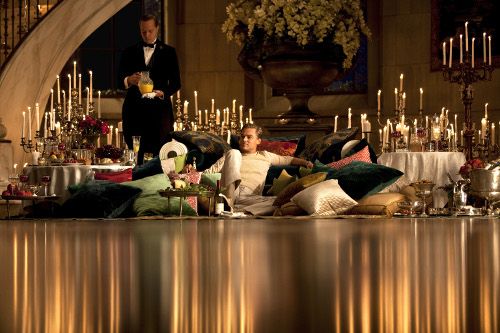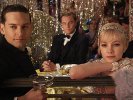Eye For Film >> Movies >> The Great Gatsby (2013) Film Review
The Great Gatsby
Reviewed by: Amber Wilkinson

Baz Luhrmann and co-writer Craig Pearce take the slow, slow, quick, quick, slow rhythms of the foxtrot to heart in this adaptation of F Scott Fitzgerald's The Great Gatsby. Swooping camera movements are often followed by moments of stillness, speeding car journeys counterpointed by serious conversations and bacchanalian parties punctuated by the sight of Nick Carraway (Tobey Maguire) looking like a little boy lost as he brandishes his invitation.
Nick is a sunnyside up kind of guy, or at least he was before we meet him, recalling events and his slide into alcoholism from within a sanitorium. But that is now and, ironically, we're in the business of trying to repeat the past.

So, Nick remembers when he was new in New York and trying to make his way, moving into a small cottage in West Egg, Long Island. Across the bay, in East Egg, lives his distant cousin Daisy (Carey Mulligan at her most fragile). We meet her, and pal Jordan (Elizabeth Debicki) as they seem to materialise on the couch of the mansion she shares with millionaire husband Tom (Joel Edgerton), their presence announced by a flurry of laughter and a single, perfectly manicured hand reaching over the back of the sofa. With the gauzy curtains in the room carelessly billowing in the wind and the girls little more than beautiful ornaments, it's a decadent moment and a benchmark of what is to come - and that is excess in every department.
Fortunately, Moulin Rouge! proved Luhrmann knows a thing or two about excess and he embraces it again here in scenes to an off-kilter jazz score, where Tom meets his lower-class mistress Myrtle (Isla Fisher) - her red stockings overcompensating for a life more ordinary - and at extravagant parties hosted by the mysterious Jay Gatsby (Leonardo DiCaprio, who seems to be taking a lesson or two from Dorian Gray lately). In the spirit of letting it all hang out, he uses the 3D well but I suspect the quieter scenes will work better in plain old two dimensions. Nick, who is Gatsby's neighbour, finds himself caught somewhere between the twin orbits of Daisy and Jay simultaneously "without and within". It is bad enough for him that he finds himself complicit in Tom's extramarital activities but soon he also becomes privy to the history between Jay and Daisy, even as Jay's personal background remains mysterious.
The decadence, of course, hides decay - physical and moral. To reach the city from Tom and Daisy's estate, they must drive through an industrial poverty trap. Luhrmann shoots this as excessively as one of Jay's gatherings, emphasising the dirt with as much gusto as butterfly party glitter, while a battered optician's sign balefully gazes down. More impressive, however, are his hints of corruption elsewhere - the mysterious men in mob-chic round at Jay's place, a street full of windows offering glances into other lives in the city and the hedonism without thought for consequence of the revellers, whose world remains a foreign country that Nick only ever seems to visit. Even jokes of excess have a melancholic underpinning, so that the sight of a plate of carefully crafted fairy cakes is simultaneously funny and forlorn when sitting in the shadow of the entire contents of a bakery. As Jordan, strongly present despite only a handful of scenes, puts it "I like large parties. They're so intimate."
Occasionally, Luhrman pushes things just too far, with a moment or two straying close to music video silliness - such as his desire to make the Nick's typed words appear sporadically, although with no particular rhythm, on the screen, which feels like style for style's sake.
But generally Luhrmann is in full control, creating tension between this facade of folly and the carelessness that lies beneath. He also gets great performances, for the most part, from his actors. DiCaprio brings a moody contemplation to Jay, a man for whom the only way is up even when the indications are that things may head in the opposite direction, and Maguire's wide-eyed growing affection for his neighbour is perfectly pitched. Mulligan, meanwhile, makes Daisy more than just a pretty face, adding an edge of panic to her, as we see her trapped not so much by her own feelings as by the expectations of the men in her life and a desire to keep up appearances. Only Edgerton sticks out, paradoixically offering too much and not quite enough as Tom. The character feels too big for him and he has a tendency to blunder in rather than bring a subtle menace - casting an American actor more in tune with the concept of US old money might have been a smarter move. But this is Jay's movie and when he pulls up in that bright yellow car, you're going to want to go on the ride.
Reviewed on: 15 May 2013



















